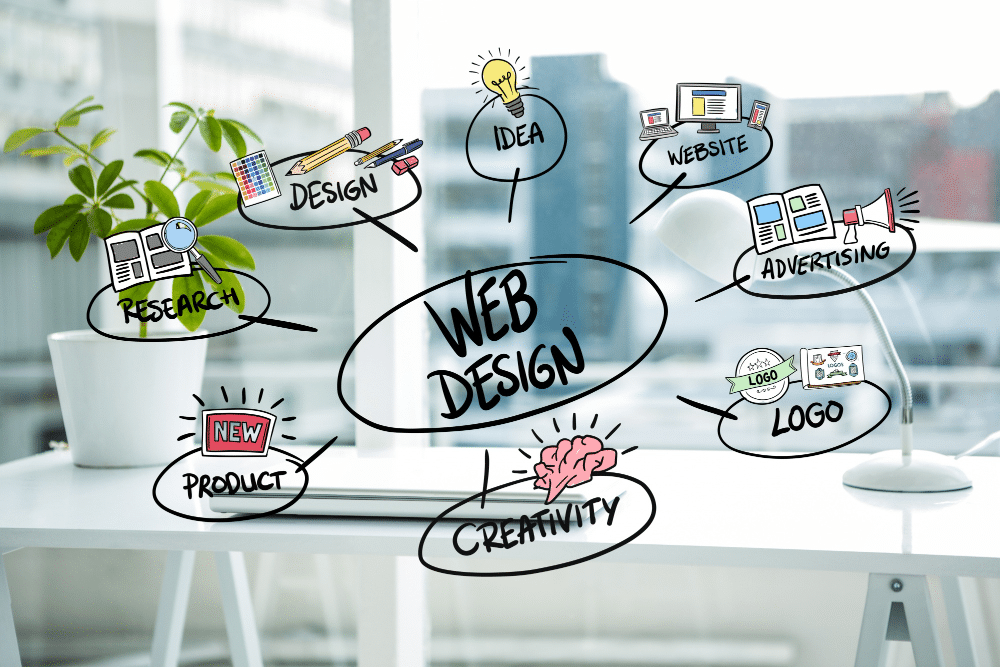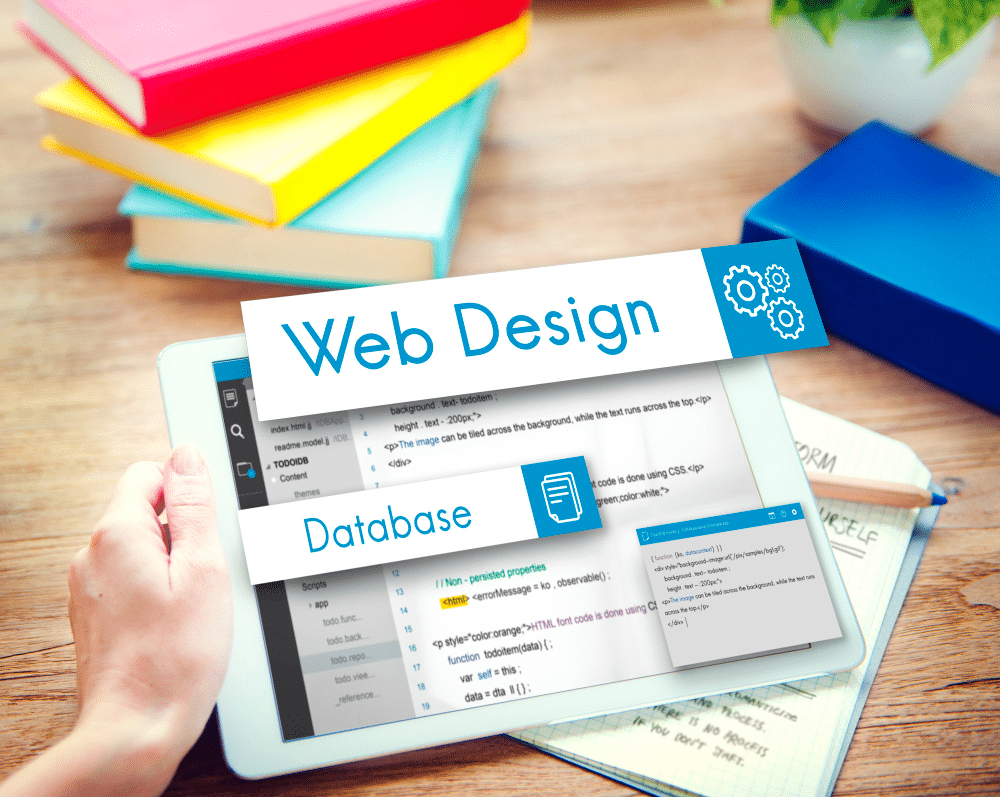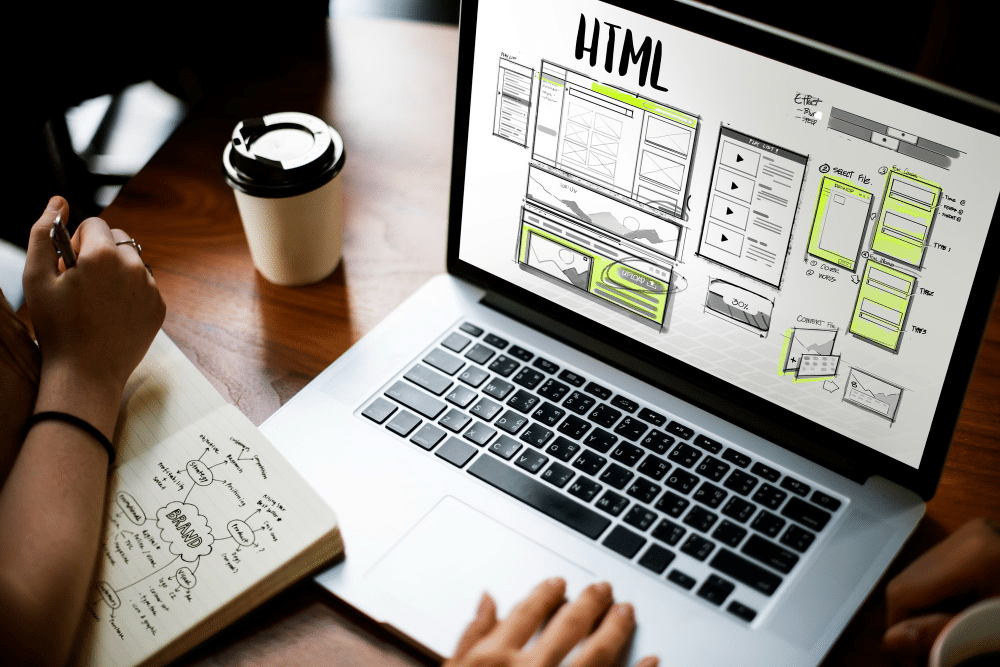
In today’s digital era, having a prominent online presence is crucial for all businesses. Your website often serves as the first point of contact between your potential customers and your brand. It’s not just a digital brochure; it’s a powerful marketing tool.
But how can you be sure that your website effectively represents your brand and engages your audience?
That’s where web design agencies come into play. In this article, we’ll explore the world of web design agencies and answer the very common question: What does a web design agency do?
So without further ado, let’s dive right in.
Understanding the Basics of Web Design

Before we dive into the roles and responsibilities of web design agencies, let’s start with the basics.
Web design encompasses the visual and functional aspects of a website. It involves creating a layout, selecting colour schemes and typography. It also involves arranging content in a way that is visually appealing and user-friendly.
Effective web design also considers the user experience (UX) and user interface (UI). This helps make sure that website visitors can easily navigate and interact with the site.
Services Offered by Web Design Agencies

Here’s a detailed breakdown of the key services provided by web designers in agencies:
1) User Interface (UI) & User Experience (UX) Design
UX and UI Design are fundamental aspects of web design.
UX focuses on creating a positive and meaningful user experience by ensuring the website is intuitive, easy to navigate, and user-friendly.
UI, on the other hand, deals with the visual elements of the website, including layout, colours, typography, and interactive elements.
A professional web design agency pays meticulous attention to UX and UI to create websites that not only look great but also provide a seamless and enjoyable user experience.
2) Front-end Development
Front-end development translates the design into a functional website that users can interact with directly.
Web development services have front-end developers who specialise in coding the HTML, CSS, and JavaScript necessary to bring the design to life in the browser. They ensure the website is responsive, compatible with various devices and browsers, and functions as intended.
3) Back-end Development
While front-end development focuses on the user interface, back-end development deals with the server-side functionality of a website. It involves creating database server logic and ensuring data is stored and retrieved correctly.
Back-end developers at web design agencies ensure that websites have robust and secure server infrastructure. Their professional web designers create features like user authentication, database management, and dynamic content generation.
4) E-commerce Website Development

For brands wanting to sell services or products online, web design agencies offer e-commerce website development services. This involves creating online stores with features like product listings, shopping carts, secure payment gateways, and inventory management.
E-commerce websites require careful design and development to provide a seamless shopping experience for customers.
5) Content Creation and Management
Web design isn’t just about aesthetics; it’s also about the content that fills your website. Content creation and management services provided by agencies include copywriting, creating engaging graphics, and organising content for maximum impact.
6) Search Engine Optimisation (SEO)
SEO is optimising a website so that it improves its online visibility in search engine results pages, i.e. SERPs.
Web design agencies integrate SEO best practices into the design and development process. This includes optimising site structure, content, meta tags, and images. All this helps ensure the website ranks well on search engines like Google.
SEO is again an important part of web design services for getting organic traffic to the site and increasing the brand’s online visibility.
7) Website Maintenance and Support

Websites require continuous updates, security patches, and content management to remain relevant and secure.
Web design agencies offer website maintenance and support services as well. This helps ensure that your site remains in top condition. This includes regular backups, software updates, bug fixes, and content updates. All these help keep your website running smoothly.
8) Website Hosting
Website hosting involves providing a server infrastructure where your website’s files and data are stored and accessible to visitors.
Many web developer agencies offer hosting services, ensuring your website is hosted on reliable servers with adequate performance and security features. They can also assist with domain registration and management.
9) Website Analytics and Reporting
To measure the effectiveness of your website and make informed decisions, web design agencies often integrate website analytics and reporting tools. These tools give valuable insights into user behaviour, traffic sources, conversion rates, and more.
Web designers use this data to optimise the website for better performance and user engagement. They also create regular reports to inform clients about the website’s performance and areas for improvement.
The Web Design Process

Here are all the stages you will be asked to go through.
1) Initial Consultation and Project Discovery
The Initial Consultation and Project Discovery phase is the starting point of any successful web design project.
During this stage, you, as the client, will sit down with the web design agency. You will then discuss your goals, objectives, and vision for your website.
This phase involves several key elements:
-
Goal Identification: You will articulate the main objectives of your website. These include increasing brand awareness, generating leads, or selling products online. These goals provide a clear direction for the project.
-
Target Audience Analysis: Understanding your key target audience is also very important. You’ll work with the agency to define your ideal customers, their preferences, and their needs. This information informs the design and content strategy.
-
Project Requirements: Specific project requirements are outlined. This may include features, functionality, technical specifications, and special requests or considerations.
2) Planning and Strategy
After the initial consultation, the web design agency moves on to the Planning and Strategy phase. During this stage, the agency’s team works closely with you to create a comprehensive plan for your website.
Key elements of this phase include:
-
Information Architecture: Defining the website’s structure, including the navigation menu, page hierarchy, and content organisation. This makes sure that your visitors can easily find what they’re looking for.
-
Design Mockups and Wireframes: Web designers create wireframes and mockups that outline the visual layout of the website. These visual representations help you visualise the design direction.
-
Technology Stack Selection: Deciding on the technologies and platforms that will be used for the website, such as content management systems (e.g., WordPress), programming languages, and frameworks.
-
Content Strategy: Identifying the type of content needed for the website, including images, text, videos, and other multimedia elements. Content planning ensures that the website effectively communicates your message.
3) Design and Development Phases

The Design and Development Phases are where the creative work takes centre stage. Designers and developers collaborate to bring your website to life.
Here’s what happens during these stages:
-
Visual Design: Designers create the visual elements of the website. This includes the layout, colour scheme, typography, and graphical assets. They ensure that the design aligns with your brand identity and project objectives.
-
Front-end Development: Front-end developers translate the design into HTML, CSS, and JavaScript code. This code is responsible for what users see and interact with within their web browsers. It ensures the website is responsive and works seamlessly across devices.
-
Back-end Development: Back-end developers focus on server-side functionality. They build databases, set up server logic, and ensure that the website can handle dynamic content, user accounts, and data processing.
Design mockups and development progress are often shared for feedback and approval.
4) Testing and Quality Assurance

The Testing and Quality Assurance phase is critical to ensure that your website functions flawlessly and provides a positive user experience.
Here’s what’s involved:
-
Compatibility Testing: The website is tested on various browsers (e.g., Chrome, Firefox, Safari) and devices (desktop, mobile, tablet) to ensure consistent performance and appearance.
-
Functionality Testing: Every interactive element, such as forms, buttons, and navigation menus, is thoroughly tested to ensure they work as intended.
-
Performance Testing: The website’s speed and load times are evaluated to ensure quick page loading and optimal user experience.
-
Security Testing: Vulnerabilities are identified and addressed to protect the website from potential threats and attacks.
-
Content Review: All content is reviewed for accuracy, relevance, and consistency with the project’s objectives.
5) Launch and Ongoing Maintenance
The Launch and Ongoing Maintenance phase marks the official release of your website to the public. However, it doesn’t end there.
This phase involves:
-
Deployment: The website is deployed to a live server, making it accessible to users on the internet.
-
Post-launch Quality Checks: Final checks are performed to ensure that the live website functions as expected and that there are no issues.
-
Ongoing Support: Many web design agencies offer ongoing maintenance and support services. This can include regular updates, security patches, content management, and technical support to keep your website up-to-date, secure, and running smoothly.
-
Performance Monitoring: After launch, the agency may monitor the website’s performance, gather user feedback, and make necessary improvements to enhance user experience and achieve your goals.
Benefits of Hiring a Web Design Agency

Why do you need to hire a web design agency for your website needs?
Here are some compelling reasons:
-
Professionalism and Expertise: Web design agencies have a team of professionals who have the skills and expertise needed to create high-quality websites.
-
Time and Cost Savings: Outsourcing your web design project to an agency saves you time and money compared to attempting to design and develop a website on your own.
-
Get the Latest Design Trends and Technologies: Web design agencies stay updated with the latest design trends and technologies, ensuring your website remains modern and competitive.
What Should I Look for in a Good Web Design Agency?

Picking the right web design agency is an important decision that can heavily impact the success of your online presence.
To make the right choice, consider the following factors:
Experience
Experience is a key indicator of a web design agency’s ability to deliver quality results. Look for an agency with a proven record and a portfolio of successful projects.
Here’s what to consider:
-
Portfolio: Review the agency’s portfolio to see examples of their past work. Pay attention to the diversity of projects and industries they’ve worked with.
-
Client References: Contact previous clients if possible to get insights into their experiences with the agency. Ask about the timeliness, quality of work, and communication.
-
Years in Business: The length of time an agency has been in business can be a good indicator of stability and experience. An agency with a wealth of experience will understand your specific needs and challenges.
Expertise
Expertise refers to the agency’s proficiency in various aspects of web design and development. A good web design agency should have a skilled and knowledgeable team that can handle your project effectively.
Consider the following:
-
Technical Skills: Ensure that the agency has expertise in the platforms and platforms that are relevant to your project. Consider web development frameworks, content management systems, and e-commerce solutions.
-
Design Capabilities: Assess the agency’s design capabilities. Check their ability to make visually appealing and user-friendly interfaces.
-
Specialisation: Some agencies have expertise in certain industries or types of websites (e.g., e-commerce, nonprofit, corporate). Pick an agency that aligns with your specific needs.
-
Certifications and Awards: Look for any certifications or awards that reflect the agency’s commitment to excellence in web design and development.
Communication

Communication is vital for a successful partnership between you and the web design agency. Effective communication ensures that your goals, expectations, and feedback are understood and addressed.
Here’s what to consider:
-
Responsiveness: Evaluate how promptly the agency responds to your inquiries and requests. Quick responses indicate good communication practices.
-
Transparency: An agency should be transparent about its processes, timelines, and costs. You should have a clear understanding of how the project will unfold.
-
Project Updates: Determine how the agency communicates project progress and milestones. Regular updates keep you informed and engaged throughout the process.
-
Problem-Solving: Effective communication also involves the agency’s ability to handle challenges and find solutions collaboratively.
Collaboration
Collaboration is the synergy between you and the agency to achieve common goals. A good web design agency will be a partner in your project, working together with you.
Consider the following:
-
Client Involvement: Assess how the agency involves you in the design and development process. Your input should be welcomed and incorporated into the project.
-
Feedback Handling: Evaluate how the agency handles feedback and revisions. A collaborative agency will actively seek your input to refine the project.
-
Team Collaboration: Internal collaboration within the agency’s team is also important. A well-coordinated team can deliver a more cohesive final product.
Budget

Budget considerations are essential when selecting a web design agency. It’s important to find an agency that can work within your budget constraints and provide quality work.
Here’s what to consider:
-
Cost Transparency: Ensure that the agency provides a clear breakdown of costs, including design, development, and any additional services.
-
Scope of Work: Define the scope of work and discuss how changes or additions may impact the budget. Be clear about your budget limitations from the outset.
-
Value for Investment: Consider not only the initial cost but also the long-term value of the website. A well-designed and maintained site can yield a strong return on investment.
Services
Services offered by the agency should align with your project requirements. Evaluate whether the agency provides a comprehensive range of services to meet your needs.
Consider the following:
-
Service Offerings: Ensure that the agency offers the specific services you require, such as web design, development, SEO, maintenance, and hosting.
-
Customisation: Determine if the agency can tailor their services to your unique goals and challenges rather than providing a one-size-fits-all solution.
-
Scalability: Consider whether the agency can accommodate the growth and evolution of your website over time.
Conclusion

In conclusion, a web design agency plays a pivotal role in helping companies establish a strong online presence. Their expertise in design, development, content creation, and SEO can help create a huge difference in your website’s effectiveness.
The amount of services provided by a web development agency is far greater than those provided by a freelance web designer.
By picking the right web design agency, you can get a website that looks good and delivers results.
Hiring an agency for web design is an investment in your brand’s success in the digital marketing world.
